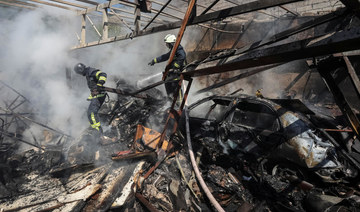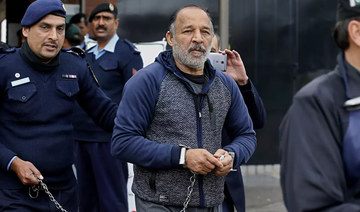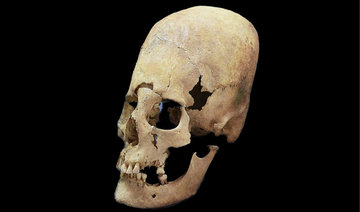TORONTO: The allegation of India’s involvement in the killing of a Sikh Canadian is based on surveillance of Indian diplomats in Canada, including intelligence provided by a major ally, a Canadian official familiar with the matter told The Associated Press on Thursday.
The official said the communications involved Indian officials and Indian diplomats in Canada and that some of the intelligence was provided by a member of the “Five Eyes” intelligence-sharing alliance, which includes the US, Britain, Australia and New Zealand, in addition to Canada.
The official did not say which ally provided intelligence or give specific details of what was contained in the communications or how they were obtained. The official spoke on condition of anonymity because they were not authorized to discuss the matter publicly.
The Canadian Broadcasting Corporation first reported details of the intelligence.
Earlier Thursday, India stopped issuing visas to Canadian citizens and told Canada to reduce its diplomatic staff as the rift widened between the once-close allies over Ottawa’s allegation that New Delhi may have been involved in the killing of Hardeep Singh Nijjar, a 45-year-old Sikh separatist, in a Vancouver suburb in June.
Ties between the two countries have plunged to their lowest point in years since Canadian Prime Minister Justin Trudeau said Monday there were “credible allegations” of Indian involvement in the assassination.
Nijjar, a plumber who was born in India and became a Canadian citizen in 2007, had been wanted by India for years before he was gunned down outside the temple he led in the city of Surrey.
Speaking Thursday on the sidelines of the UN General Assembly, Trudeau acknowledged the complicated diplomatic situation he faces.
“The decision to share these allegations on the floor of the House of Commons was not done lightly,” he said. “There is no question that India is a country of growing importance and a country that we need to continue to work with.”
“We are not looking to provoke or cause problems but we are unequivocal around the importance of the rule of law and unequivocal about the importance of protecting Canadians.”
The bombshell allegation set off an international tit-for-tat, with each country expelling a diplomat. India called the allegations “absurd.”
Canada has yet to provide public evidence to back Trudeau’s allegations, and Canada’s UN ambassador, Bob Rae, indicated that might not come soon.
“This is very early days,” Rae told reporters Thursday, insisting that while facts will emerge, they must “come out in the course of the pursuit of justice.”
“That’s what we call the rule of law in Canada,” he said.
On Thursday, the company that processes Indian visas in Canada announced that visa services had been suspended until further notice.
The suspension means Canadians who don’t already have visas cannot travel to India. Canadians are among the top travelers to India: In 2021, 80,000 Canadian tourists visited the country, according to India’s Bureau of Immigration.
Indian External Affairs Ministry spokesperson Arindam Bagchi blamed the visa suspension, which includes visas issued in third countries, on safety issues.
“Security threats being faced by our High Commission and consulates in Canada have disrupted their normal functioning. Accordingly, they are temporarily unable to process visa applications,” Bagchi told reporters. He gave no details on the alleged threats.
The announcement quickly rippled across Canada, especially among people with ties to India.
Sukhwinder Dhillon, a 56-year-old grocery store owner in Montreal, said he had a trip planned to India to see family and sort out his deceased father’s estate. Dhillon, who came to Canada in 1998, said he makes the trip every two or three years and has lost two immediate family members since he was last home.
“My father passed, and my brother passed,” Dhillon said. “I want to go now. ... Now I don’t know when we’ll go.”
Bagchi, the Indian foreign ministry spokesman, also called for a reduction in Canadian diplomats in India, saying they outnumbered Indian diplomats in Canada. “We have informed the Canadian government that there should be parity” in staffing, he said.
The Canadian High Commission in New Delhi said Thursday that its consulates in India are open and continue to serve clients. It said some of its diplomats had received threats on social media, prompting it to assess its “staff complement in India.” It added that Canada expects India to provide security for its diplomats and consular officers working there.
On Wednesday, India warned its citizens to be careful when traveling to Canada because of “growing anti-India activities and politically condoned hate-crimes.”
India’s security and intelligence branches have long been active in South Asia and are suspected in a number of killings in Pakistan. But arranging the killing of a Canadian citizen in Canada, home to nearly 2 million people of Indian descent, would be unprecedented.
India has criticized Canada for years over giving free rein to Sikh separatists, including Nijjar. New Delhi had accused him of links to terrorism, which he denied.
Nijjar was a local leader in what remains of a once-strong movement to create an independent Sikh homeland, known as Khalistan. A bloody Sikh insurgency shook north India in the 1970s and 1980s until it was crushed in a government crackdown in which thousands of people were killed, including prominent Sikh leaders.
While the active insurgency ended decades ago, the Indian government has warned that Sikh separatists are trying to stage a comeback and pressed countries like Canada, where Sikhs comprise over 2 percent of the population, to do more to stop them.
At the time of his killing, Nijjar was working to organize an unofficial Sikh diaspora referendum on independence from India.
New Delhi’s anxieties about Sikh separatist groups in Canada have long been a strain on the relationship, but the two have maintained strong defense and trade ties and share strategic interests over China’s global ambitions.
In March, Indian Prime Minister Narendra Modi’s government summoned the Canadian high commissioner in New Delhi, its top diplomat in the country, to complain about Sikh independence protests in Canada.
Signs of a broader diplomatic rift emerged at the summit of the Group of 20 leading world economies hosted by India earlier this month. Trudeau had frosty encounters with Modi, and a few days later Canada canceled a trade mission to India planned for the fall. A trade deal between the two is now on pause.
On Wednesday, India’s National Investigation Agency said it has intensified its crackdown on Sikh insurgents operating in India.
It announced rewards of up to 1 million rupees ($12,000) for information leading to the arrest of five insurgents, one of whom is believed to be based in neighboring Pakistan. It accused them of extorting money from businesses for a banned Sikh organization, the Babbar Khalsa International, and of targeted killings in India.
Surveillance of Indian diplomats in Canada led to allegations around Sikh killing — official
https://arab.news/ngdnt
Surveillance of Indian diplomats in Canada led to allegations around Sikh killing — official
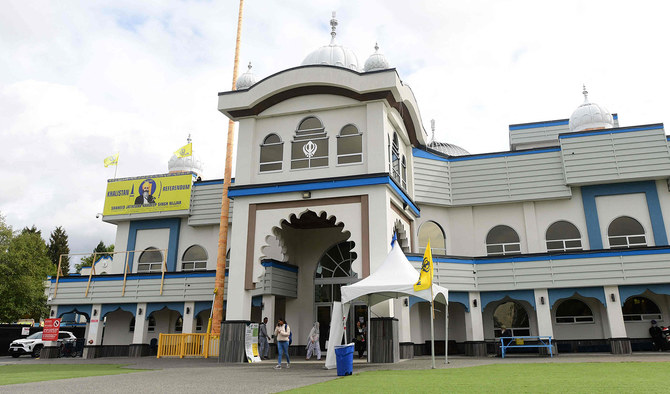
- Communications involved Indian officials and diplomats in Canada
- Some intelligence given by member of “Five Eyes” intel-sharing alliance
Drone footage shows devastation in Ukraine’s strategic eastern city of Chasiv Yar as Russians advance
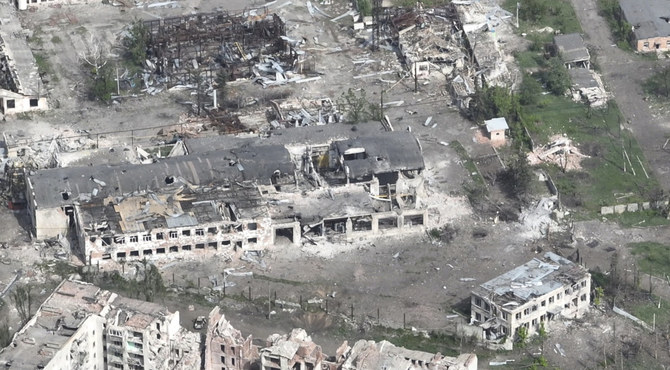
- The destruction is reminiscent of the cities of Bakhmut and Avdiivka, which Ukraine yielded after months of bombardment and huge losses for both sides
- Russia launched waves of assaults against Chasiv Yar’s outnumbered defenders as Ukraine's US and European allies dilly-dallied on sending fresh supplies
KYIV, Ukraine: Months of relentless Russian artillery pounding have devastated a strategic city in eastern Ukraine, new drone footage obtained by The Associated Press shows, with barely a building left intact, homes and municipal offices charred and a town that once had a population of 12,000 now all but deserted.
The footage shows Chasiv Yar — set amid green fields and woodland — pounded into an apocalyptic vista. The destruction is reminiscent of the cities of Bakhmut and Avdiivka, which Ukraine yielded after months of bombardment and huge losses for both sides.
The strategically important city has been under attack by Russian forces for months. Capturing it would give Russia control of a hilltop from which it can attack other cities that form the backbone of Ukraine’s eastern defenses.
That would set the stage for a potentially broader Russian offensive that Ukrainian officials say could come as early as this month.
Russia launched waves of assaults on foot and in armored vehicles at Chasiv Yar’s outnumbered Ukrainian troops, who have run desperately short of ammunition while waiting for the US and other allies to send fresh supplies.
Rows of mid-rise apartment blocks in Chasiv Yar have been blackened by blasts, punched through with holes or reduced to piles of timber and masonry. Houses and civic buildings are heavily damaged. The golden dome of a church remains intact but the building appears badly damaged.
No soldiers or civilians were seen in the footage shot Monday and exclusively obtained by the AP, apart from a lone man walking down the middle of a road between wrecked structures.
Regional Gov. Vadym Filashkin said Wednesday on Ukrainian TV that 682 residents have held on in Chasiv Yar, living in “very difficult conditions.” The city had a pre-war population of over 12,500. Filashkin said that those remaining have lacked running water and power for over a year, and that it is “ever more difficult” for humanitarian aid to reach them.
The destruction underscores Russia’s scorched-earth tactics throughout more than two years of war, as its troops have killed and displaced thousands of civilians.
NATO Secretary-General Jens Stoltenberg acknowledged Monday that the delayed delivery of allies’ military aid to Ukraine had left the country at the mercy of the Kremlin’s bigger and better-equipped forces.
Ukraine and its Western partners are racing to deploy critical new military aid that can help check the slow but steady Russian advance as well as thwart drone and missile attacks.
Elsewhere, Ukrainian authorities reported that two civilians died and at least nine others, included an 11-year-old boy, were wounded Wednesday after Russian aerial guided bombs pummeled a village in the northeastern Kharkiv region.
According to Gov. Oleh Syniehubov, a 64-year-old man and 38-year-old woman — both locals — were killed after one of the bombs detonated near their car in Zolochiv, some 20 kilometers (12 miles) from the border with Russia.
In the southern Black Sea port of Odesa, at least 13 people were wounded after a Russian ballistic missile slammed into the city late Wednesday, regional Gov. Oleh Kiper said in a Telegram update. He did not say what had been hit, but reported the blast had sparked a major fire.
Videos circulating on social media showed huge plumes of smoke rising skywards at the site. Nova Poshta, a large Ukrainian postal and courier company, said in a Facebook post Wednesday that one of its sorting depots had been struck, but claimed no employees were among those hurt.
Odesa has been a frequent target for Russian firepower, with eight civilians killed by Russian missiles in the city over the past two days.
UK police officer charged with showing support for Hamas
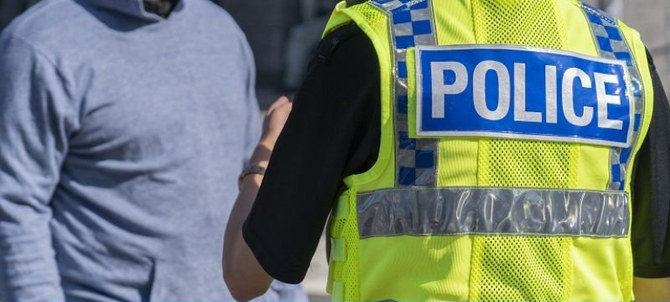
- Mohammed Adil, from Bradford in northern England, was arrested last November and charged following an investigation
- Adil, a police constable, has been suspended from his job with West Yorkshire Police and is due to appear in court on Thursday
LONDON: A British police officer has been charged with a terrorism offense for allegedly publishing an image in support of Hamas, a group banned in Britain as a terrorist organization, police said on Wednesday.
Mohammed Adil, 26, from Bradford in northern England, was arrested last November and charged following an investigation by British counter-terrorism officers, Counter Terrorism Policing North East said in a statement.
The police watchdog, the Independent Office for Police Conduct (IOPC), said the inquiries had focused on messages shared on WhatsApp which had concluded the case should be referred to prosecutors.
“On Monday, PC Mohammed Adil, 26, was charged with two counts of publishing an image in support of a proscribed organization, specifically Hamas, contrary to section 13 of the Terrorism Act,” the IOPC statement said. “The offenses are alleged to have taken place in October and November 2023.”
Adil, a police constable, has been suspended from his job with West Yorkshire Police and is due to appear before London Westminster Magistrates’ Court on Thursday.
Since the Oct. 7 attacks by Hamas on Israel, police have arrested and charged a number of people at pro-Palestinian protests in London for showing support for the group, while counter-terrorism commanders say they have also had a large amount of online content referred to them.
Family of 7-year-old girl trampled on boat while crossing Channel feared repatriation to Iraq

- Sara Alhashimi was crushed to death when a large group of men rushed onto an overloaded inflatable dinghy she had boarded with her parents and 2 siblings
- Her father says his family was told they were to be deported to his home country of Iraq after living in Europe for 14 years
LONDON: A seven-year-old Iraqi girl was crushed to death in a small, overcrowded boat as her family, who feared repatriation to Iraq after years living in Europe, attempted to cross the English Channel from France to the UK, the Guardian reported on Wednesday.
Sara Alhashimi was with her father Ahmed Alhashimi, mother Nour Al-Saeed, 13-year-old sister Rahaf and 8-year-old brother Hussam when they boarded an inflatable dinghy at Wimereux, south of Calais, last Tuesday.
But Alhashimi, 41, said that as it set sail, a large group of men rushed onboard and he lost his grip on his daughter. Unable to move because of the crush, he could not reach her and she was trampled. Four other people also died.
Alhashimi said he left Basra around 2010 after he was threatened by an armed group. Sara, his youngest child, was born in Belgium. The family had also lived in Sweden and submitted asylum applications to several EU countries but all were rejected. Their attempt to cross the channel last week was their fourth in two months since arriving in the Pas de Calais region, after police prevented the previous crossings.
Alhashimi told the BBC: “If I knew there was a 1 percent chance that I could keep the kids in Belgium or France or Sweden or Finland I would keep them there.
“All I wanted was for my kids to go to school. I didn’t want any assistance. My wife and I can work. I just wanted to protect them and their childhoods and their dignity.”
Smugglers promised a guaranteed place on a boat carrying 40 migrants for €1,500 ($1,600) per adult and €750 per child, Alhashimi said.
Sara was calm, he added, as he held her hand while they walked from a railway station and then hid in dunes overnight while waiting to board their vessel. The smugglers told the group to inflate the boat shortly before 6 a.m., carry it toward the shore and run as they approached the water.
As they did so, however, a teargas canister thrown by police went off beside them, Alhashimi said, and Sara began to scream. He had been carrying her on his shoulders but once inside the dinghy he put her down so he could help daughter Rahaf get onboard.
As he tried to reach Sara in the increasingly overcrowded boat, Alhashimi said he begged a Sudanese man, who had joined them at the last minute, to get out of the way. He even punched the man, with little effect.
“I just wanted him to move so I could pull my baby up,” he said. “That time was like death itself … We saw people dying. I saw how those men were behaving. They didn’t care who they were stepping on — a child, or someone’s head, young or old. People started to suffocate.
“I could not protect her. I will never forgive myself. But the sea was the only choice I had.”
Alhashimi said was only able to reach Sara after French rescuers had arrived at the boat and removed some of the 112 people onboard.
“I saw her head in the corner of the boat,” he said. “She was all blue. She was dead when we pulled her out. She wasn’t breathing.”
Belgium recently rejected an asylum claim by the family on the grounds that Basra was a safe place for them to return to. They had spent the past seven years living with a friend in Sweden.
“Everything that happened was against my will,” said Alhashimi. “I ran out of options. People blame me and say, ‘how could I risk my daughters?’ But I’ve spent 14 years in Europe and have been rejected.”
Colombia to cut diplomatic ties with Israel

- “Tomorrow (Thursday) diplomatic relations with the state of Israel will be severed... for having a genocidal president,” Petro told a May Day rally in Bogota
- Petro, Colombia’s first leftist president, has also asserted that “democratic peoples cannot allow Nazism to reestablish itself in international politics“
BOGOTA: Colombian President Gustavo Petro said Wednesday his country will sever diplomatic ties with Israel, whose leader he described as “genocidal” over its war in Gaza.
“Tomorrow (Thursday) diplomatic relations with the state of Israel will be severed... for having a genocidal president,” Petro, a harsh critic of the devastating war against Hamas, told a May Day rally in Bogota.
Petro has taken a critical stance on the Gaza assault that followed an unprecedented Hamas attack on southern Israel on October 7 — which resulted in the deaths of some 1,170 people, mostly civilians, according to Israeli figures.
In October, just days after the start of the war, Israel said it was “halting security exports” to Colombia after Petro accused Israeli Defense Minister Yoav Gallant of using language about the people of Gaza similar to what the “Nazis said of the Jews.”
Petro, Colombia’s first leftist president, has also asserted that “democratic peoples cannot allow Nazism to reestablish itself in international politics.”
In February, Petro suspended Israeli weapons purchases after dozens of people died in a scramble for food aid in the war-torn Palestinian territory — an event he said “is called genocide and recalls the Holocaust.”
In the October attack, Hamas militants also took about 250 hostages, 129 of whom remain in Gaza, including 34 Israel says are presumed dead.
Israel’s retaliatory offensive has killed at least 34,568 people in Gaza, mostly women and children, according to the health ministry in the Hamas-run territory.
UK auction house removes Egyptian skulls from sale after outcry
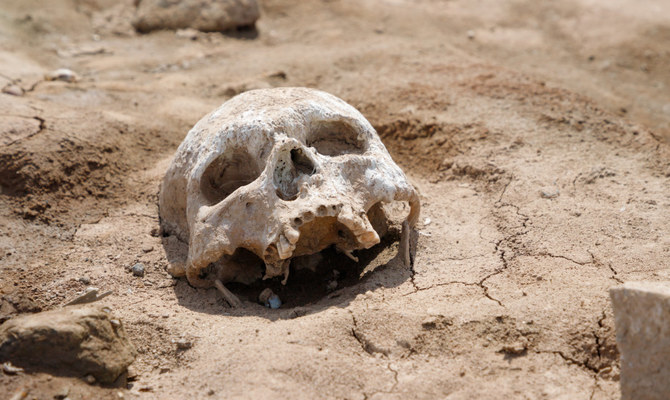
- Lawmaker condemns trade as ‘gross violation of human dignity’
- Items were part of collection owned by English archaeologist Augustus Pitt Rivers
LONDON: A UK auction house has removed 18 ancient Egyptian human skulls from sale amid condemnation by a member of Parliament, The Guardian reported.
Labour MP Bell Ribeiro-Addy said the sale of human remains for any purpose should be outlawed and described the trade as a “gross violation of human dignity.”
Semley Auctioneers in Dorset had listed the skulls with a guide price of £200-£300 ($250-$374) for each lot. The collection included 10 male skulls, five female and three of an uncertain sex.
Some of the skulls were listed as coming from Thebes and dating back to 1550 B.C.
They were originally collected by Augustus Henry Lane Fox Pitt Rivers, an English soldier and archaeologist who established the Pitt Rivers Museum in Oxford, which contains about 22,000 items.
After being housed at a separate private museum on his estate, the skulls were sold as part of a larger collection to his grandson, George Pitt Rivers, who was interned during the Second World War for supporting fascist leader Oswald Mosley.
Ribeiro-Addy said: “This despicable trade perpetuates a dark legacy of exploitation, colonialism and dehumanization. It is a gross violation of human dignity and an affront to the memory of those whose lives were unjustly taken, or whose final resting places were desecrated.
“We cannot allow profit to be made from the exploits of those who often hoped to find evidence for their racist ideology. It is imperative that we take decisive action to end such practices and ensure that the remains of those who were stolen from their homelands are respectfully repatriated.”
Britain has strict guidelines on the storage and treatment of human remains, but their sale is permitted provided they are obtained legally.
Saleroom, an online auction site, removed the skulls from sale after being contacted by The Guardian. Its website states that human remains are prohibited from sale.
A spokesperson said: “These items are legal for sale in the UK and are of archaeological and anthropological interest.
“However, after discussion with the auctioneer we have removed the items while we consider our position and wording of our policy.”
Prof. Dan Hicks, Pitt Rivers Museum’s curator of world archaeology, said: “This sale from a legacy colonial collection that was sold off in the last century shines a light on ethical standards in the art and antiquities market.
“I hope that this will inspire a new national conversation about the legality of selling human remains.”
Some of the skulls in the auction had been marked with phrenological measurements by the original collector, he said.
“The measurements of heads in order to try to define human types or racial type was something that Pitt Rivers was continuing to do with archaeological human remains in order to try to add to his interpretations of the past.”




